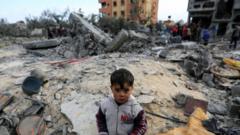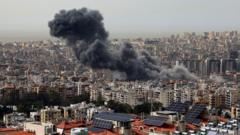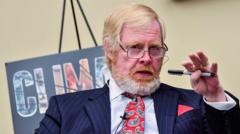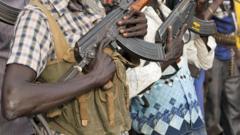In the largest manifestation of discontent against Hamas since the outbreak of war, hundreds marched in Beit Lahia, demanding an end to the group’s governance. Armed Hamas militants dispersed the protest, reflecting a spike in public dissent against the ruling party amidst ongoing violence and destabilization in Gaza.
Growing Dissent: Gaza's Largest Anti-Hamas Protest Erupts Amid Ongoing Conflict
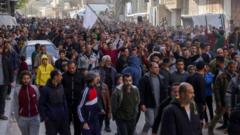
Growing Dissent: Gaza's Largest Anti-Hamas Protest Erupts Amid Ongoing Conflict
Hundreds of demonstrators took to the streets in Beit Lahia, calling for Hamas to relinquish power as the humanitarian crisis deepens amidst intensified Israeli military operations.
In an unprecedented scene during the ongoing war in Gaza, hundreds of residents from Beit Lahia demonstrated in the largest anti-Hamas protest since the conflict with Israel reignited. Protesters filled the streets chanting slogans demanding Hamas relinquish its long-standing power over Gaza. The demonstration was marked by significant unrest as masked Hamas militants, some armed, confronted and violently dispersed the protesters, resulting in several injuries.
Activists and observers shared videos on social media, showcasing the chanting crowd that echoed sentiments of "out, out, out, Hamas out". Amidst the turmoil, Hamas condemned the demonstrators, accusing them of propelling "suspicious political agendas" and trying to redirect responsibility for the ongoing violence toward the Israeli authorities. Pro-Hamas factions downplayed the protest's importance, labeling participants as traitors to the Palestinian cause.
The protests emerged in northern Gaza shortly after the militant group Islamic Jihad launched rockets into Israel, triggering Israeli military reprisals that included evacuations in Beit Lahia and further escalating tensions. Hamas is facing increasing scrutiny for its governance amid resumed Israeli airstrikes that have reportedly killed thousands of Palestinians and displaced a substantial portion of Gaza’s population.
Mohammed Diab, a local resident whose family has suffered losses in the conflict, expressed frustration with Hamas's rule: "We refuse to die for anyone, for any party's agenda or the interests of foreign states," he stated during the protest. Demonstrators also voiced their grievances against what they described as the oppressive rule of Hamas, echoing calls for an end to Muslim Brotherhood governance.
Despite the growing discontent, determining the extent of the shift in public support for Hamas remains intricate. Opposition to the group has always existed, albeit often suppressed due to fears of retaliation. Online expressions of dissent have risen, with many residents voicing the struggles faced amid the ongoing humanitarian crisis in Gaza. One local activist pointedly remarked, “Excuse me, but what exactly is Hamas betting on? They’re betting on our blood.”
In response to the dissent, Hamas official Dr. Basem Naim acknowledged the pain expressed by protesters, yet he reiterated accusations aimed at detractors, questioning why similar protests were absent in the West Bank. He criticized the exploitation of Gaza’s dire humanitarian conditions as a maneuver to evade accountability for the conflict's impact.
Since the commencement of war following Hamas's attack on Israel on October 7, 2023—which resulted in significant casualty numbers, including the deaths of about 1,200 Israelis—the escalation has led to devastating consequences in Gaza. The Hamas-run health ministry reports over 50,000 Palestinian deaths, with most of the territory’s population displaced and critical infrastructure in ruins, leaving many in dire need of basic essentials like water, shelter, and medical care.
As protests indicate a shift in public sentiment, the power dynamics within Gaza are increasingly under scrutiny, raising questions about the future of governance and the ongoing conflict.

